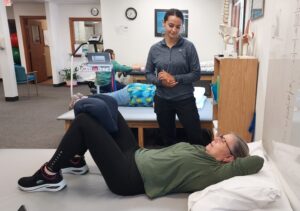
Why Do I Get Sore Riding in a Car?
For many people, riding in a car—even as a passenger—can lead to soreness, stiffness, and even pain. If you find yourself rubbing your neck or stretching your back after a road trip, you’re not alone. This discomfort is surprisingly common and physical therapy can help you both understand your body’s response to prolonged inactivity and to manage it.
Let’s break down the reasons why car rides can leave you sore and what you can do about it:

Dr. Renee Ross treats patients in the Bedford clinic.
-
Prolonged Static Posture
One of the primary culprits is staying in the same position for too long. For example, when you sit in a car for extended periods:
- Your muscles stop actively contracting and supporting your joints.
- Blood flow decreases, especially in areas like the hips, lower back, and legs.
- Fascia (the connective tissue around muscles) can become sticky and tight.
Even though you aren’t “doing” much, your body is under a form of low-grade stress just from being still. Thus, understanding your body’s response and managing it is important to overall health.
-
Poor Ergonomics
Car seats aren’t always designed with optimal posture in mind. You might unknowingly:
- Slouch in the seat.
- Hunch your shoulders.
- Crane your neck forward, especially if you’re looking at a phone or GPS.
- Keep your knees elevated or compressed in tight spaces.

Even when you’re not driving, your body’s response to inactivity is often soreness.
So, all of these positions can cause the body’s response to result in muscular imbalance, strain, or compression of joints and nerves.
-
Vibration and Road Impact
Even if you’re not driving, your body absorbs the constant vibration and micro-movements from the road. Over time, this can cause muscle fatigue—especially in the spine and hips—without you even realizing it.
-
Reduced Core Engagement
When you’re seated and relaxed, your core muscles tend to “shut off.” This can reduce stability in your pelvis and lower back, increasing the likelihood of soreness, particularly in people with pre-existing core weakness or back pain. So, core engagement is critical in reducing your body’s response to long car rides.
-
Previous Injuries or Imbalances Impact the Body’s Response
When you already have mobility restrictions, muscle tightness, or past injuries, the body’s response to long car rides is usually the exacerbation of those problem areas. For example, a tight hip flexor or a weak glute muscle might not bother you during daily life but can become a real issue when you sit still for hours.
What Can You Do About Your Body’s Response?
Here are some physical therapy-informed strategies to help reduce soreness:
✅ Take Movement Breaks
- Every 30–60 minutes, stop and stretch or walk for 5 minutes.
- Gentle movements like trunk twists, leg swings, or neck rolls can help.
✅ Use Supportive Gear
- Lumbar rolls or cushions can support your spine.
- Use a neck pillow or rolled towel to avoid forward head posture.
- Also, adjust the seat to support your hips at or slightly above knee level.
✅ Stretch Before and After Travel
- Stretching hip flexors, hamstrings, calves, and your back can reduce stiffness.
- Try a few yoga poses like Cat-Cow, Child’s Pose, or Standing Forward Fold.
✅ Strengthen Your Core
- A consistent program to build core and postural strength can improve how your body handles sitting over time.
✅ Stay Hydrated
- Dehydration can contribute to muscle cramps and fatigue, so drink water throughout the day—even if it means more bathroom breaks!
Does Physical Therapy Help Your Body’s Response?
For frequent soreness or pain that lingers beyond a trip, consult with a physical therapist. A customized assessment by a physical therapist can help identify underlying movement dysfunctions or weaknesses contributing to your discomfort. Plus, in-depth education on the body’s response to prolonged inactivity is always helpful.
Final Thoughts
Soreness from car rides isn’t just “part of getting older.” With some mindful adjustments and a little movement, you can make car travel much more comfortable. Your body was made to move—not to sit still for hours on end. Treat it kindly, and it’ll thank you with a pain-free trip.
Your body’s response to physical therapy is sure to be better than its response to those long car rides! Give us a call today: 855-722-8478. For more information about Rehab Associates, please visit our website: www.racva.com
 Dr. Harrison Hunt is a Rehab Associates partner and executive vice president of marketing. She earned her Master’s of Science in Physical Therapy from Old Dominion University and her Doctor of Physical Therapy from Rocky Mountain University. A certified manual therapist, Dr. Hunt enjoys general orthopedics and sports rehab. She sees patients in our Bedford clinic. In her spare time, Dr. Hunt enjoys running and skiing.
Dr. Harrison Hunt is a Rehab Associates partner and executive vice president of marketing. She earned her Master’s of Science in Physical Therapy from Old Dominion University and her Doctor of Physical Therapy from Rocky Mountain University. A certified manual therapist, Dr. Hunt enjoys general orthopedics and sports rehab. She sees patients in our Bedford clinic. In her spare time, Dr. Hunt enjoys running and skiing.
